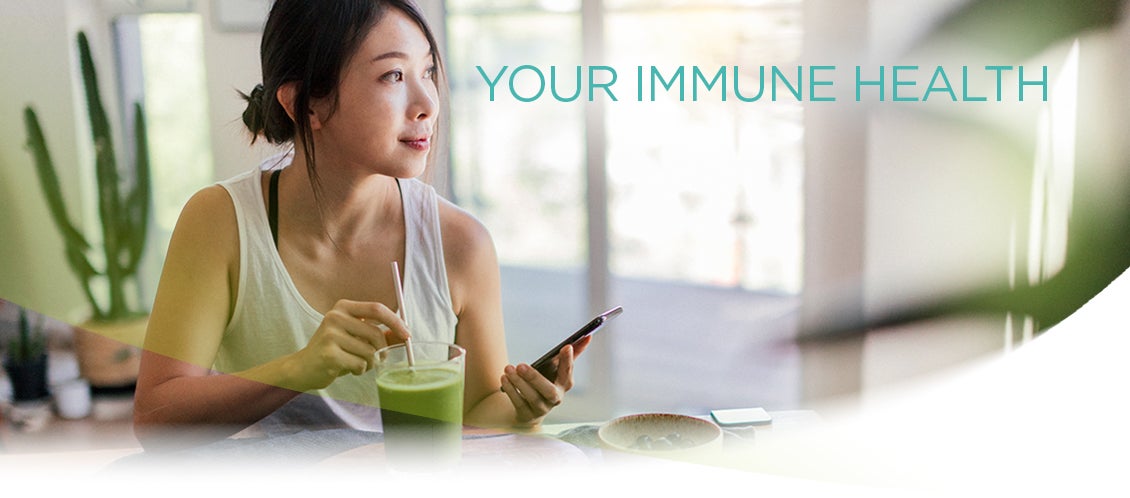

The environment we live in is full of potential threats to our health and our immune system is our first line of defense; a proactive and sensing system, which has evolved to protect us from this vast array of potentially damaging organisms and molecules. Our immune system seeks to destroy or neutralize these challenges, be they viruses or bacteria, or environmental stressors and the effects of modern living, and by doing so can help us to maintain optimal health and ensure survival in our constantly changing environment.
While a healthy immune system is able to respond swiftly to pathogens, often before we experience any symptoms, it can often become overwhelmed and work sub-optimally leaving us susceptible to illness. Supporting your immune response through both nutritional and lifestyle interventions is one of the most important things you can do to ensure good health.
FAQS
Our nutritional therapists have answered the most common questions we get asked, if you need further information, please contact our nutrition team via email nutrition@cytoplan.co.uk


Q: What are the best nutrients I should be taking to support my immune health?
Many nutrients play an essential role in immune function, so ensuring there is optimum intake of all nutrients by supplementing with a multivitamin and mineral can be useful. Nutrients of particular importance for supporting the health and function of your immune system include:
-
Vitamin A
-
Vitamin C
-
Vitamin D
-
Iron
-
Selenium
-
Zinc
-
Beta-glucans
-
Quercetin
Q: I seem to catch every cough and cold going. How can I strengthen my immune system?
Your immune health is intrinsically linked to your general health, so ensuring you have the basics in place; a healthy, nutritious diet, 7-9 hours of sleep per night, regular gentle exercise and reducing your stress levels as much as possible will be the best steps you can take to strengthening your immunity.
Digestive health is also hugely important – around 70% of your immune system is actually found within the gut and is heavily influenced by your gut bacteria. You can support your bacterial balance by ensuring a wide variety of different plant-based foods to provide fibre and prebiotics, as well as probiotic foods such as sauerkraut and kefir, or a multi-strain live bacteria probiotic supplement.
Q: I get bad hayfever every spring – is there anything I can take to prevent this?
Allergies, such as hayfever are a sign that your immune system isn’t functioning as it should, and overreacting to what it perceives as a threat, but is actually a harmless, non-infectious substance, such as pollen. The immune system will react as it would to a harmful pathogen, releasing IgE antibodies, which bind to mast cells and release histamine – which is responsible for the troublesome hayfever symptoms – itching, sneezing and runny nose.
By ensuring excellent levels of the essential nutrients to support immune health, it is possible to reduce the likelihood of an allergic reaction, or to reduce the severity of the symptoms if they do occur. Vitamin C and Quercetin are particularly noteworthy as they have natural antihistamine properties.
Q: I travel a lot for work and am worried about picking up illnesses – what can I do to reduce the risk of catching something?
Travel goes hand in hand with crowded places, dining out, change of environment, and thus an increased exposure to unfamiliar microbes, planes and airports can be a hub for all kinds of germs. Whilst there is little that can be done to change these conditions, proactively priming the immune system prior to travel may help the body defend itself against viral invaders. Consider an immune support supplement containing key nutrients including beta 1-3, 1-6 glucan for a couple of weeks before, during and for a week after a holiday. Ensuring gut health through live bacteria supplements of the probiotic yeast, Saccharomyces Boulardii can also be supportive.
Q: Does exercise improve my immune health?
Moderate exercise undoubtedly brings about several health benefits, such as boosting mood, sleep quality and energy levels as well as reducing the risk of a variety of diseases. Regular bouts of moderate-intensity exercise, up to around 45 minutes in duration have been shown to reduce inflammation and increase immunity.
Conversely, overtraining can act as a stressor to the body and make you more susceptible to illness, particularly if this is coupled with stresses from other factors and you don’t give your body sufficient time to recover through rest, proper nutrition and sleep. Nutritional deficiencies will add additional stress to your body and increase the risk of infection, so a comprehensive multivitamin and mineral is a good idea to cover any shortfalls from diet.
Do you need more support?



